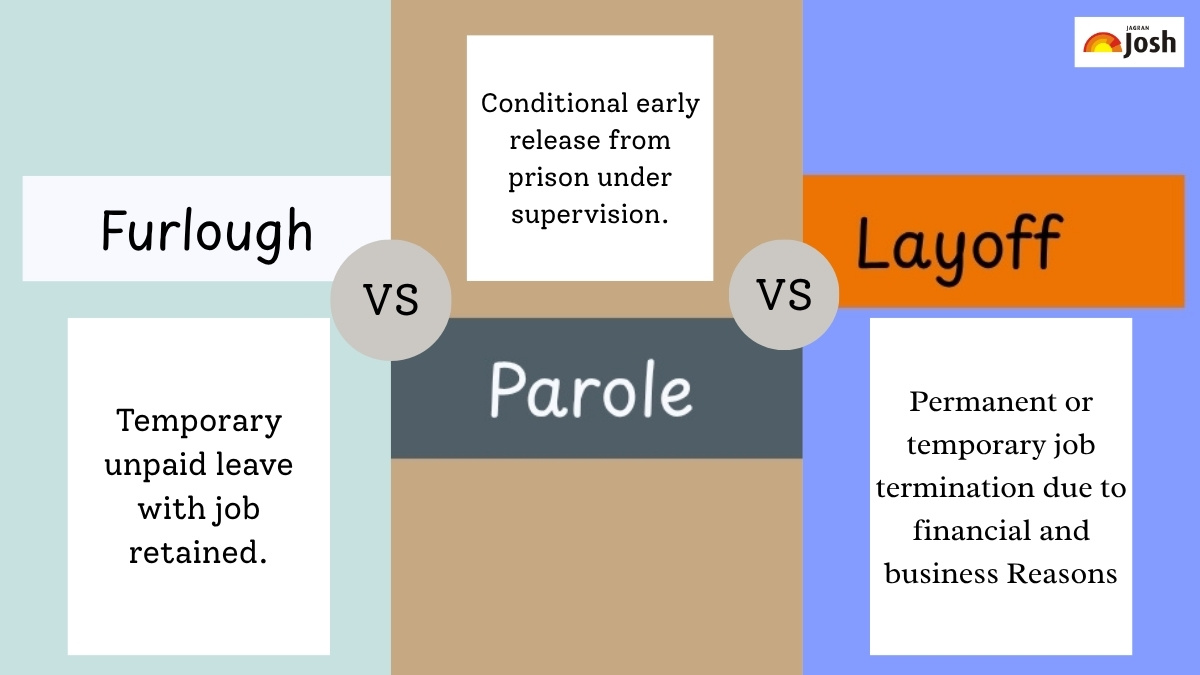Furlough vs Parole vs Layoff: In the U.S., all the terms refer to either employment, immigration or employees. When it comes to Furlough and Parole, they differ as Furlough is defined by federal law (5 U.S.C. § 7511(a)(5)), which says to place an employee in a temporary status without duties and pay. However, Parole refers to the conditional release of a prisoner before their full sentence is served, under supervision and subject to stipulated conditions. But a Layoff, in contrast, is a separation from employment caused by business or economic reasons, not misconduct.

(Note: The image shows the key difference between the three terms: Furlough, Parole and Layoff)
Therefore, to understand easily and see clearly which term applies when, the meaning of each term, when they apply & how they differ in practice, keep reading the blog.
What is Furlough?
A furlough is a temporary, unpaid leave from work mandated by an employer. Unlike a layoff, a furloughed employee still retains their job status but does not receive pay during the furlough period.
-
Furlough meaning: A pause in work without pay, usually during financial strain or government shutdowns.
-
Is furlough paid?: No, generally it is unpaid.
-
Can furloughed employees collect unemployment?: Yes, in most states, they may apply, though rules vary (furlough laws by state differ).
Furloughs can also apply in legal contexts, such as furlough from jail, where prisoners are granted short-term leave for specific reasons.
What is Parole?
Parole is a conditional release of a prisoner before completing their sentence, based on good behaviour and under supervision.
-
Parole means the release under conditions set by a parole officer.
-
Parole meaning in immigration means temporary entry to the U.S. for urgent humanitarian or public benefit reasons (immigration parole).
-
Probation and parole: While often confused, probation is a court-ordered alternative to prison, while parole comes after imprisonment.
Key Points About Parole:
-
Involves supervision by a parole officer.
-
Can be revoked if the individual breaks parole conditions.
-
Different from probation, which avoids jail time altogether.
What is a Layoff?
A layoff occurs when an employer permanently or temporarily ends someone’s employment, often due to economic downturns, restructuring, or lack of work.
-
A layoff usually means the employee loses their job entirely.
-
Sometimes layoffs can be temporary, but unlike furlough, the worker is not guaranteed reinstatement.
Furlough vs Parole vs Layoff
These terms are used in very different domains (employment, criminal justice, immigration), and often get confused in everyday conversation. The key features for each term is mentioned below:
| Term | Field | Definition | Key Features |
| Furlough | Employment & Law | Temporary, unpaid leave while keeping employee status, or short-term jail release | Unpaid, job retained, may get unemployment benefits, government furloughs possible |
| Parole | Legal & Immigration | Conditional release from prison or temporary U.S. entry (immigration parole) | Supervised, based on behaviour, parole officer involved, different from probation |
| Layoff | Employment | Permanent or temporary termination due to business or financial reasons | Job lost, no guarantee of return, may qualify for unemployment |
Furlough vs Layoff: The Employment Perspective
Furloughs keep employees on the books, but without pay. Whereas, Layoffs sever the employment relationship completely. Both may make workers eligible for unemployment benefits depending on state law.
Parole vs Probation: Legal Clarity
A Parole involves release from prison early under supervision. However, Probation is an alternative to prison, often part of sentencing. The difference between parole and probation lies in timing that a parole comes after prison, and probation often comes instead of prison.
Conclusion
Therefore, Furlough, parole, and layoff differ in purpose and meaning. This also states that a furlough is temporary unpaid leave with job retained, a parole is supervised early release from prison or conditional immigration entry, and a layoff is job termination due to business reasons. After knowing these distinctions, you may get clarity and understand rights, responsibilities, and eligibility in work or legal situations.
Also Read: How is Yom Kippur celebrated in the U.S.? Read about States & Their Celebrations!
Trump’s Oval Office Gold Revamp 2025: Inside the White House Makeover
Who is Julie Foudy? Check Biography, Early Life & Education Here!
To see more of such stories, you can go ahead and add this site to your preferred sources by clicking here.
Comments
All Comments (0)
Join the conversation